Llano Beef Cattle Field Day 2018
BRADY — The Texas A&M AgriLife Extension Service will conduct a multi-county Wildlife Field Day Sept. 17 at Heart of Texas Trophy Whitetails, 755 Private Road 922 in Brady.
Registration will begin at 8:30 a.m., with the program to follow from 9 a.m.-3:00 p.m. The cost is $25, and lunch will be provided. Three Texas Department of Agriculture general continuing education units will be offered.
The deadline to RSVP is Sept. 10. RSVP by phone to the AgriLife Extension office in any of the participating counties: Gillespie, 830-997-3452; Mason, 325-347-6459; Llano, 325-247-5159; McCulloch, 325-597-1295; or Menard, 325-396-4787.
Organizers said the program will offer the latest wildlife management information in several areas of interest to land managers across the Edwards Plateau Hill Country.
Topics and speakers will include:
– Wild Turkeys – John Tomecek, Ph.D., Texas A&M AgriLife Extension wildlife specialist, San Angelo.
– Beneficial and Problem Plants – Bob Lyons, Ph.D., Texas A&M AgriLife Extension range specialist, Uvalde.
– Recreational Deer Feeding Program – Alicia Erwin, Record Rack, Lubbock.
– High-Fenced and Deer-Breeding Feed Program – Corey Schlensker, Record Rack, Lubbock.
– Whitetail Breeding Pen Tour – Grant Evridge, owner Heart of Texas Trophy Whitetails, Brady.
"We have assembled a great group of experts, and I think any landowner with wildlife will benefit tremendously from this field day," said Justin Klinksiek, AgriLife Extension agent for McCulloch County.
For more information, contact Klinksiek at 325-597-1295 or Lisa Brown, AgriLife Extension agent for Menard County, at 325-396-4787.
-30-
The post Wildlife Field Day set Sept. 17 in Brady appeared first on AgriLife Today.
- Writer: Adam Russell, 903-834-6191, adam.russell@ag.tamu.edu
- Contact: John Tomecek, 325-650-3520, john.tomecek@ag.tamu.edu
COLLEGE STATION – Dove season 2022 should provide a good opening weekend starting Sept. 1, but birds' access to food and water will be a major factor in harvest success, according to a Texas A&M AgriLife Extension Service expert.

Texas dove season begins Sept. 1. Check local regulations to ensure compliance with Texas state law regarding these migratory game birds. (Courtesy photo)
John Tomecek, Ph.D., AgriLife Extension wildlife specialist, Thrall, said hunters with access to areas where the birds have food sources, water and roosts should have an advantage over areas without.
Tomecek said drought conditions around the state will concentrate dove near resources as they migrate south. So if you want a successful hunt, go where dove can find food, water and shelter.
"Birds can spread out when there is plenty of water and food sources everywhere, but dry, hot weather over the last few months will limit where they will be found," he said. "Having water sources like ponds or troughs to hunt over, especially in western parts of the state, should improve success."
Dove food sources
Agriculture crops such as sesame, sunflowers and sorghum are attractive food sources to dove. Providing food sources for dove can improve hunter success, but it can also be illegal if state laws are not followed, Tomecek said.
AgriLife Extension has publications regarding legal supplemental feeding for dove. "Normal Agricultural Operations and Dove Hunting: How to Legally Provide Food Sources and Improve Hunting Opportunities," co-authored by Tomecek can be downloaded for free at the Texas A&M AgriLife Extension Bookstore.
Know what's legal
Broadcasting seed or grains before and during dove season in an attempt to attract birds is illegal, he said. But broadcasting in the normal act of planting winter forages is legal when standard practices of seed drilling or broadcasting on prepared beds followed by light disking or dragging is incorporated.
When it comes to dove, landowners and managers are allowed to grow seed- and grain-bearing crops such as sesame or sorghum for the sole purpose of attracting dove and can manipulate stands in any way throughout the season to provide a food source for birds, Tomecek said.
However, he said, it is important to note that in areas where waterfowl harvest also occurs, grains may be planted and grown, but must be harvested for commercial production. "Restrictions on Waterfowl Hunting and Baiting," can also be downloaded for free from the AgriLife Extension Bookstore.
"The best way to explain it is that if you put seed or grain on the ground this time of year from a sack, it's likely illegal," he said. "If you planted it and it is maturing during hunting season, you can manipulate it in any way to hunt over it throughout the season."
Advice for crop shredding
Tomecek recommends grain-bearing crops intended for dove not be shredded all at once.
"Divide the coverage area by the number of weeks of the season and shred a percentage each week to keep food on the ground," he said. "Mourning dove need the grain or seed to be on the ground since they cannot perch and eat at the same time."
White-winged dove are capable of lighting and picking grains and seeds from food sources, he said. They are a larger dove species that has continued to expand its range farther north.
"Overall, we are hoping for a good dove season," he said. "Bird numbers will depend on location, but it's really about getting out to the field with friends and family or taking someone who has never been dove hunting before. It's a tradition that makes lasting memories."
-30-
The post Dove season 2019: Food, water sources likely to drive hunter success appeared first on AgriLife Today.
Livestock guardian dogs will be one of the ways to manage predators discussed on Sept. 17 in Brownwood. (AgriLife Extension photo by Susan Himes)
BROWNWOOD — The Texas A&M AgriLife Extension Service will be holding a livestock predator program on Sept. 17 at the Brown County Fairgrounds, 4206 U.S. Highway 377 S. in Brownwood.
The program will address the question of what livestock and/or wildlife producers can do to manage predators.
The cost is $30 if preregistered by Sept. 10 and $40 after that date. Fees are payable at the door, and cost includes a catered lunch. To preregister, contact the AgriLife Extension office of Brown County at 325-646-0386.
Five Texas Department of Agriculture continuing education units are available, three in integrated pest management and two general.
"Coyotes, bobcats, feral hogs, black-headed vultures, mountain lions and a few more wild animals are all currently causing livestock and deer losses due to predation," said Scott Anderson, AgriLife Extension agent for Brown County. "These livestock predators are in Brown and every other surrounding county. It seems that predator numbers continue to grow each year."
Program topics and speakers include:
- Utilizing guardian dogs to manage predators – Bill Constanzo, AgriLife Extension livestock guardian dog specialist, San Angelo.
- Wildlife Services predator management – Mike Bodenchuk, Texas state director, U.S. Department of Agriculture – Animal and Plant Health Inspection Service, Wildlife Services, San Antonio.
- Wild Pig Control and Management – Josh Helcel, AgriLife Extension associate, Texas A&M Natural Resources Institute, College Station.
- Managing coyote, mountain lion and bobcat predators – John Tomecek, Ph.D., AgriLife Extension wildlife specialist, San Angelo.
- Nuisance wildlife predator management – Maureen Frank, Ph.D., AgriLife Extension wildlife specialist, Uvalde.
The event is presented by the AgriLife Extension offices of Brown, Mills and San Saba counties. For more information, call 325-646-0386 or email Anderson at sa-anderson@tamu.edu.
-30-
The post Livestock predator program set Sept. 17 in Brownwood appeared first on AgriLife Today.
LAMPASAS — The Texas A&M AgriLife Extension Service is holding a cow and calf clinic Sept. 18 in Lampasas. The event starts at 8:30 a.m. with registration and refreshments; presentations will run from 9 a.m.-noon.
The event is presented by the AgriLife Extension offices of Burnet and Lampasas counties, and will be held at the Lampasas County Farm Bureau, 1793 N. U.S. Hwy 281. Three Texas Department of Agriculture general continuing education units are available.
The cost is $15. Call the AgriLife Extension office in Lampasas County at 512-556-8271 to preregister by Sept. 16. The featured speaker is John Tomecek, Ph.D., AgriLife Extension wildlife specialist, Thrall.
"We wanted this clinic to include discussions on additional ways your ranch can provide income, beyond cattle," said Heath Lusty, AgriLife Extension specialist, Lampasas County. "We are excited to have Dr. Tomecek on hand to share his experiences and expertise with our attendees."
Topics to be discussed by Tomecek include:
- Diversifying Ranch Income: Alternative wildlife enterprises.
- Is it Right for Me? Developing a wildlife-watching business on your property.
- What's in a Lease? Considerations for setting hunting and wildlife watching lease terms.
-30-
The post Central Texas cow, calf clinic set Sept. 18 in Lampasas appeared first on AgriLife Today.
Programs will be July through September at agency office for Bexar County
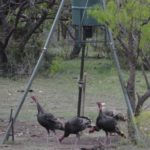
Wild turkey gather under a feeder full of corn. (Texas A&M AgriLife Extension Service photo)
SAN ANTONIO – The Texas A&M AgriLife Extension Service will present the Urban Wildlife Series "Texas Game Species" July through September in San Antonio.
The six programs of the series, sponsored by the Bexar County Agriculture & Natural Resources Committee, will be held at the agency's office in the Conroy Square business complex, 3355 Cherry Ridge Dr. Each will be held from 10 a.m.-noon in Suite 208 of the complex.
The cost is $30 for the series or $10 per program and payable at the door, but registration is required by June 14. To reserve a spot for series programs, contact Frances Elizondo at the AgriLife Extension office at 210-631-0400 or frances.morenoelizo@ag.tamu.edu.
Dates, topics and speakers will be:
June 18 — Managing Private Lands for Wildlife Habitat, Dr. Roel Lopez, director, Texas A&M Natural Resources Institute, San Antonio.
July 9 — Bobwhite Quail Management, Dr. Maureen Frank, AgriLife Extension wildlife specialist, Uvalde.
Aug. 8 — Rio Grande Wild Turkey Management, Dr. John Tomecek, AgriLife Extension wildlife specialist, College Station.
Aug. 20 — Whitetail Deer Management, Frank.
Sept. 10 — Texas Game Fish, Dr. Todd Sink, AgriLife Extension fisheries specialist, College Station.
Sept. 24 — Get Ready to Hunt, Frank.
Make checks payable to Bexar Ag and Natural Resources Committee and mail registration fee to Texas A&M AgriLife Extension Service, Attn: Frances, 3355 Cherry Ridge, Suite 212, San Antonio, TX 78230.
-30-
Writer: Paul Schattenberg, 210-859-5752, paschattenberg@ag.tamu.edu
Contact: Sam Womble, 210-631-0400, Sam.Womble@ag.tamu.edu
The post AgriLife Extension to present Texas Game Species series in San Antonio appeared first on AgriLife Today.
Writer: Susan Himes, 325-657-7315, Susan.Himes@ag.tamu.edu
Contact: Pascual Hernandez, 325-387-3101, Pascual.Hernandez@ag.tamu.edu
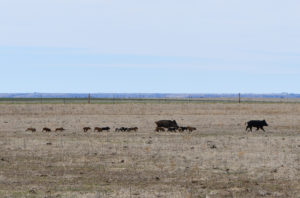
Feral hogs are just one of the many invasive species that can be problematic for Texas farms and ranches. (AgriLife Extension photo by Kay Ledbetter)
SONORA — The Texas A&M AgriLife Extension Service offices in Sutton and Crockett counties will present a Texas Invasive Species Workshop on April 17 at the Sutton County Civic Center, 1700 N. Crockett Ave., Sonora.
Onsite registration is at 8 a.m., and the program will begin at 8:30 a.m. Three Texas Department of Agriculture continuing education units – one general, one laws and regulations, and one integrated pest management – are available for those with a pesticide applicators license.
The cost of the workshop is $15; after April 12, it is $25. The fee covers program materials, refreshments and lunch.
Checks should be made out to Sutton Ag Program Fund and mailed to P.O. Box 1047, Sonora, TX, 76950. For more information or to register, call the AgriLife Extension office in Sutton County at 325-387-3101.
"Invasive species impact our ecosystems and consequently our management of rangelands," said Pascual Hernandez, AgriLife Extension agent, Sutton County. "With this workshop, we hope to heighten awareness of some of the invasive species that we encounter in the Edwards Plateau. We will take a look at both plant and animal, as well as native and non-native, invasive species."
Topics and speakers include:
- Feral Hog Impact on Native Plant Communities/Update on Feral Hog Abatement Efforts – Dr. John Tomecek, AgriLife Extension wildlife specialist, College Station.
- Invasive Plants in the Edwards Plateau – Dr. Barron Rector, AgriLife Extension range specialist, College Station.
- Axis Deer Biology, Behavior, Ecological Impact – Matt Buchholz, doctoral student/research assistant, Texas Tech University department of natural resources management, Lubbock.
- Pesticide Laws and Regulations – Corey Pence, Texas Department of Agriculture.
-30-
The post Texas Invasive Species Workshop set April 17 at Sutton County Civic Center appeared first on AgriLife Today.
Writer: Susan Himes, 325-657-7315, Susan.Himes@ag.tamu.edu
Contact: Scott Anderson, 325-646-0386, Scott.Anderson@ag.tamu.edu
BROWNWOOD — The annual Brown County Ag Day program, presented by the Texas A&M AgriLife Extension Service, is scheduled for April 9 at the Brown County Fairgrounds, 4206 US Highway 377 South, Brownwood.
Registration begins at 5:30 p.m., and the program starts at 6 p.m. with a meal courtesy of the Brown County Farm Bureau. The Brown County Ag Day is open to all. The fee is $10 at the door.
Preregistration is requested by April 5 at https://brown.agrilife.org/brown-county-ag-day/ or by contacting the AgriLife Extension office in Brown County at 325-646-0386.
Dr. John Tomecek, AgriLife Extension statewide wildlife specialist, San Angelo, will present his program, "Ramping Up Springtime Predator Control Efforts."
"The vast majority of the rural land in our area is privately owned and utilized for livestock and wildlife production," said Scott Anderson, AgriLife Extension agent, Brown County.
"It is no secret that predator numbers are increasing, especially during the springtime with new calves, lambs, goats and fawns being born," Anderson said. "Dr. Tomecek's program will cover important predation information that folks should be aware of."
-30-
The post AgriLife Extension's Brown County Ag Day set April 9 in Brownwood appeared first on AgriLife Today.
- Contact: Ricky Thompson, 936-560-7711, r-thompson@tamu.edu
NACOGDOCHES – A continuing education course for agriculture producers, workers, landowners and ranchers will be held Nov. 7 in Nacogdoches.
Registration begins at 8 a.m. inside the Nacogdoches Expo Center, 3805 NW Stallings Drive. The Texas A&M AgriLife Extension Service course begins at 9 a.m. and ends at 3 p.m.
Cost is $30 for attendees registered by Nov. 1 and $35 on the day of the event. Mail registration to the AgriLife Extension office in Nacogdoches County, 203 W. Main St., Nacogdoches, 75961.
Five continuing education units will be available, including one drift minimization, one laws and regulations, and three general. An agricultural trade show including vendors such as Heritage Land Bank, Rozell Sprayer Manufacturing Co., Express Scale Services, Shelby Savings Bank and more will be onsite during the program.
A barbecue lunch will be provided.
Speakers and topics to be discussed include:
– Dr. Allen Knutson, AgriLife Extension entomologist, Dallas, Controlling Pasture Insects.
– Daniel Mielke, Corteva Agrisciences representative, Rudolph, Wisconsin, Herbicide Recommendations and Updates.
– Dr. Barron Rector, AgriLife Extension range specialist, College Station, Herbicide Application.
– Dr. Don Renchie, AgriLife Extension pest management program director, College Station, Pesticide Laws and Regulations Updates.
– Dr. John Tomecek, AgriLife Extension wildlife specialist, Thrall, Predator Management, including M-44 and Livestock Protection Collars.
"This event is a great opportunity for applicator license holders to get five CEUs and hear from some the top scientists in pest and weed management," said Ricky Thompson, AgriLife Extension agent, Nacogdoches County.
-30-
The post Integrated pest management CEU program set for Nov. 7 in Nacogdoches appeared first on AgriLife Today.
Reduced wildlife numbers expected going into hunting season
- Writer: Adam Russell, 903-834-6191, adam.russell@ag.tamu.edu
- Contact: Dr. John Tomecek, 325-650-3520, john.tomecek@ag.tamu.edu
THRALL – Drought conditions throughout much of the state this summer likely will mean lower wildlife numbers this hunting season, said a Texas A&M AgriLife Extension Service expert.
Dr. John Tomecek, AgriLife Extension statewide wildlife specialist, Thrall, said deer, quail and turkey numbers would likely be affected. Fewer forbs and reduced nutritional value in browse and other food crops along with typical predation are contributing factors, he said. Hunters should also be careful not to over hunt quail broods.
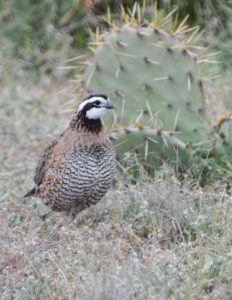
Quail hunters should be mindful to not over hunt local birds as numbers declined due to drought. (Texas A&M AgriLife Extension Service photo by Steve Byrns)
"Hunters in areas that experienced drought conditions can expect reduced numbers because of the heat and lack of rain and nutrition on the ground," he said. "Young animals will probably be a little poorly going into the season, though recent rains may help them bounce back a little. But generally, hunters aren't going to see the quality on a region-to-region basis that they might have seen the last few years."
Tomecek said he does not expect catastrophic herd declines in deer as happened during the 2011 drought. But along with fewer deer, hunters will likely see a decline in antler quality.
"Genetics play a role in antler quality, but the vast majority of antler production is nutrition," he said. "It would take an aggressive supplementation regimen for a deer herd to make a difference because it's very difficult to replace an entire diet with supplemental feed."
The Texas Parks and Wildlife Department quail survey is not complete yet, but long-term AgriLife Extension studies show quail numbers dwindle during drought, Tomecek said. This means hunters and landowners should pay close attention to the quail they are harvesting to avoid a long-term detrimental effect on local bird populations.
Tomecek said landowners are very adept to self-regulation when it comes to quail, and that this season might be the time to dial back on harvest numbers.
"Historically, severe drought conditions can have a sharp effect on quail in the short-term," he said. "Quail should have a lot of offspring compared to the number of adults during a typical year. So, hunters should age the birds in hand during hunts. If they see higher numbers of mature birds and not many juvenile birds, they may want to stop hunting for the season to avoid cutting into the brood stock too much."
Turkey numbers will likely be affected by drought conditions, but hens and young birds have a dietary option – insects – that may assist a flock's survival rate,Tomecek said.
"Turkeys don't reproduce in high numbers like quail, so hunters might see smaller flocks," he said. "Hens and younger birds have a more flexible diet and may have zeroed in on insects. We had a decent grasshopper crop this summer, and those birds may have made good use of them."
Tomecek said dove season has been slow in many areas of the state, but migration numbers could rise quickly with a cold front.
"I would tell hunters to have their shells and shotguns ready for the first real cold front of the season," he said. "Landowners who have millet, sorghum or another seed crops would be smart to hold off shredding some until then and cut heavy before the cold front. That might mean birds stay in an area for a day or two if there is extra food on the ground."
AgriLife Extension district reporters compiled the following summaries:
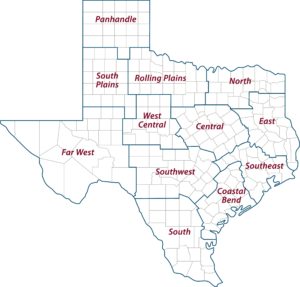
The 12 Texas A&M AgriLife Extension Districts
CENTRAL: Most fields and pastures had armyworms, and producers were actively spraying between rains. Pastures and crops continued to recuperate following recent rains. Livestock were in good condition. Hay producers should be able to get one or two more cuttings. A majority of cotton producers were done harvesting. Nearly all counties reported good soil moisture. Overall crop, livestock, rangeland and pasture ratings were good in a majority of counties.
ROLLING PLAINS: Recent rains helped replenish soil moisture and fill stock tanks. Pastures and rangelands improved and were in fair to good condition. Armyworms were very active in pastures, lawns and newly sprouted wheat. Winter wheat planting picked up. Producers were applying fertilizer and defoliating cotton. Cotton started to bloom in some areas.
COASTAL BEND: No report.
EAST: Scattered thunderstorms paired with steady rains continued to replenish soil moisture levels across the district. Gregg County ponds were filling up, and conditions were extremely wet. Marion County reported ponds were still low as was the quality of grasses in pastures. Anderson County reported cotton was fair, and land preparation for wheat planting was at a standstill. Pasture and rangeland conditions were poor in Wood, Anderson and Marion counties and good in Sabine and Shelby counties. All other counties reported pasture and rangeland conditions were fair. Sabine County reported warm-season grasses rebounded, and producers were hopeful about forage and hay crops and chances of a good third cutting. Subsoil conditions were adequate apart from Marion, Angelina and Houston counties, which reported short conditions. Topsoil conditions were surplus in Panola, Gregg and Polk counties. Anderson, Marion and Houston counties reported short topsoil conditions, and all other counties reported adequate conditions. Anderson and Marion county producers continued supplemental feeding due to drought. Livestock were fair to good in Smith County with some supplementation taking place. Houston County cattle prices were up, and buyers were aggressive with continued optimism for wheat. Gregg County cattle prices were holding steady to lower than average overall. Armyworms were very destructive in all counties despite producers spraying. Cherokee and Panola counties' producers were reporting the worst infestations they'd ever experienced. Anderson and Shelby counties reported insecticides became hard to find due to armyworm outbreaks. Feral hogs were still a problem in Anderson, Wood and Henderson counties. Horn files were out in full force in Anderson County.
SOUTH PLAINS: Recent frequent rains helped saturate the topsoil and subsoil, but most areas still needed more moisture. Rains varied across counties from 0.5 of an inch to 3-plus inches. Cooler temperatures and more cloudy days prevented moisture evaporation. Crops continued to mature. Producers began the peanut harvest. Armyworms damaged much of the hay crop. Cotton looked very good despite short moisture this season. Producers were beginning to utilize harvest aides and prepare for harvest. Winter wheat needed moisture. Some ranchers reported improved pasture conditions. Pastures and rangelands remained in fair to good condition. Cattle were in good condition.
PANHANDLE: Temperatures were near-normal with some moisture in areas. Rain events also brought fall like temperatures. More moisture was still needed throughout the district. Armstrong County was still very dry but was expecting to receive moisture. Sorghum started coloring, and some wheat was planted. Pasture conditions were still dry, but no fires were reported in the past couple of weeks. Carson County received some rain, but conditions were still very dry. Hall County received county-wide rain, which eased drought pressure and helped pasture and cattle conditions. Cotton looked good and continued to develop, but producers were concerned about fiber maturity due to cooler night-time temperatures. Lint yield potential remained very high. Cotton harvest aid applications were expected to start soon. Peanuts were being harvested. Ochiltree County received some general rainfall, which halted early corn harvest and wheat planting activities. Wheat already planted was off to an excellent start. Grain sorghum continued to develop with record-breaking yields expected. Harvest of early planted fields should begin soon. Soybean harvest was halted due to rainfall, but yields so far were very good.
NORTH: With the recent rain, most of the counties reported adequate topsoil and subsoil moisture. Over the district, reports of anywhere from 4-6 inches of rain fell during the reporting period. Almost every county reported armyworm numbers were almost insurmountable. Despite a vast outbreak of armyworms, farmers did not report significant damages to crops so far. Grasses were green, and pastures and hayfields had rebounded. Hay producers were ecstatic with recent cuttings. Livestock were in good condition.
FAR WEST: No report.
WEST CENTRAL: Rains of up to 2 inches were reported, but all areas needed more moisture. Pastures improved, and forage growth increased. Many producers were waiting for conditions to dry enough to plant small grain. Armyworm activity increased. The market continued an upward price trend with stocker steers and heifers selling $5 to $10 higher per hundredweight. Prices on feeder steers and heifers were steady to $2 higher per hundredweight. Packer cows and bulls were steady. Pairs and bred cows continued to grow in demand with improved grazing conditions and hay production potential.
SOUTHEAST: Rainfall replenished soil moisture. Livestock were in good condition. Some cotton was harvested and weathered the rain well. Wet field conditions in some areas halted cotton harvest, and defoliated cotton fields that received rains were seeing seeds germinating in the bolls. Armyworm numbers were high and were impacting pastures and hay fields. Rains helped green up pastures. Rangeland and pasture ratings varied from excellent to poor with good being most common. Soil moisture levels ranged from adequate to surplus with adequate being most common.
SOUTHWEST: Pasture and rangeland conditions improved significantly due to recent rains. The soil profile was fully saturated. Rivers, creeks and tanks were filled. Cotton farmers found it difficult to harvest due to recent rains. Livestock conditions responded favorably to increased forages. Producers in many counties were battling armyworms.
SOUTH: Parts of the district reported mild weather conditions with the continuation of adequate soil moisture levels. Some parts reported surplus moisture following rains. Rain amounts ranged from 3-21 inches for the reporting period. Very little field activity was reported due to rain. Conditions were good for many cotton producers, but it could be challenging getting the remainder of their cotton out. About 75 percent of cotton was harvested in some areas. Peanut harvest of early planted fields was slowed, and some Southern blight and leaf spot were reported. Armyworms came out aggressively. Pasture and rangeland conditions improved dramatically with recent rainfall. Stock tank levels increased, and forage conditions were improving in quality and quantity. Body condition scores on cattle were good and improving. Some producers reported field conditions should be suitable for wheat, spinach and cabbage planting soon with no additional rainfall. Pecans were reaching split shuck stage in some orchards. No supplemental feeding was reported.
-30-
The post Texas Crop and Weather Report – Sept. 25, 2018 appeared first on AgriLife Today .
Media contact: Blair Fannin, 979-845-2259, b-fannin@tamu.edu
MENARD – The 2022 Menard County Range Workshop sponsored by the Texas A&M AgriLife Extension Service and the Menard County Soil and Water Conservation District is set for Oct. 3 at the Murchison/Whitehead Memorial Youth Complex, 190 W. U.S. Highway 190 in Menard.
Registration begins at 7:30 a.m. with the program starting at 8 a.m. Cost is $25 per person or $35 per couple. Lunch is included and sponsored by Capital Farm Credit. Five Texas Department of Agriculture continuing education units will be offered: two integrated pest management, two general and one laws and regulations.
"From range management and current leasing legal issues to predator control, we have a variety of topics that will be of interest to all producers," said Lisa Brown, AgriLife Extension agent for Menard County.
Topics and speakers will be:
– Individual Plant Treatment and Sprayer Calibration, Dr. Bob Lyons, AgriLife Extension range specialist, Uvalde.
– Leasing Laws, Tiffany Dowell Lashmet, AgriLife Extension agricultural law specialist, Amarillo.
– Predator Control Using Livestock Guardian Dogs, Bob Buchholz, rancher.
– Chemical Management of Live Oak Wilt, Dr. David Appel, Texas A&M AgriLife Research plant pathologist, College Station.
– Wild Pig Management, Dr. John Tomecek, AgriLife Extension wildlife specialist, Thrall.
– Identifying and Treating Mexican Needle Grass, Dr. Barron Rector, AgriLife Extension range specialist, College Station.
To register, call 325-396-4708 or 325-396-4787 by Oct. 2.
-30-
The post Menard County Range Workshop set for Oct. 3 appeared first on AgriLife Today.
Writer: Paul Schattenberg, 210-859-5752, paschattenberg@ag.tamu.edu
Contact: Julie Zimmerman, 512-398-3122, julie.zimmerman@ag.tamu.edu
LULING – The Texas A&M AgriLife Extension Service and others will present the Multi-County Wildlife Management Workshop Oct. 17 at the Luling Foundation Farm, 523 S. Mulberry in Luling.

There will be a Multi-County Wildlife Management Workshop on Oct. 17 in Luling. (Texas A&M AgriLife Extension Service photo)
The workshop will begin with registration from 7:45-8:15 a.m., followed by a welcome and presentations to start at 8:20 a.m. The program will conclude at 3:30 p.m.
"Presentations relating to wildlife management will be given by AgriLife Extension personnel as well as experts from the Texas Wildlife Association, Texas Parks and Wildlife and the Meadows Center," said Julie Zimmerman, AgriLife Extension agent, Caldwell County.
Three Texas Department of Agriculture continuing education units — one integrated pest management, one laws and regulations and one general — will be offered to commercial, non-commercial and private pesticide applicators.
There is an early bird registration fee of $15 for registration by Oct. 11. Payment is by check only, payable to "Demonstration Fund" and delivered or mailed to the AgriLife Extension office in Caldwell County, 1403-B Blackjack St., Lockhart, Texas 78644.
On-site registration will be $25, payable by check or cash. No credit cards will be accepted.
Morning workshop topics and presenters will be:
— Wildlife Rules and Regulations, Joann Garza-Mayberry, Texas Game Warden.
— Wildlife Group Membership and Legislative Updates for 2022 Session, David Yeates, CEO, Texas Wildlife Association.
— Range Herbicide Labels and Product Use, Dr. Bob Lyons, AgriLife Extension range specialist, Uvalde.
— Wildlife Habitat Management and Doe Population, Robert Trudeau, wildlife biologist, Texas Parks and Wildlife .
From 11:30 a.m. to 12:45 p.m. attendees will have lunch, participate in a tabletop discussion and have the opportunity to visit educational booths. From 12:45 – 1:15 p.m., tabletop discussion reports will be presented, and there will be an "ask an expert" segment in which they may have questions about wildlife answered.
Afternoon workshop topics and presents will be:
— Nature Tourism: Integrating Alternative Income from Wildlife, Dr. John Tomecek, AgriLife Extension state wildlife specialist, Thrall.
— Wild Pig Management – Balancing Population Control and Game Use, Jacob Hetzel, wildlife biologist, Texas Wildlife Services/U.S. Department of Agriculture Animal and Plant Health Inspection Service.
— Regional Approach to Wild Pig Management, Nick Dornak, watershed services program manager, Meadows Center.
Afternoon presentations will be followed by a short wrap-up and evaluation.
-30-
The post Multi-County Wildlife Management Workshop slated for Oct. 17 in Luling appeared first on AgriLife Today.
Writer: Steve Byrns, 325-653-4576, s-byrns@tamu.edu
Contact: Josh Blanek, 325-659-6523, j-blanek@tamu.edu
SAN ANGELO – The Texas A&M AgriLife Extension Service will conduct the Concho Valley Wild Pig Management Workshop on Sept. 12 at the Texas A&M AgriLife Research and Extension Center at San Angelo.
The center is located north of town on U.S. Highway 87. The free multi-county workshop opens at 8:30 a.m. with registration, followed by the program from 9 a.m.–2:30 p.m.
The AgriLife Extension counties involved with the event are Tom Green, Irion, Sterling, Coke, Runnels, Concho and Schleicher.
This event is provided through a Clean Water Act Section 319(h) nonpoint source grant from the Texas State Soil and Water Conservation Board and the U.S. Environmental Protection Agency.
Lunch will be provided courtesy of the Coke County Livestock and Wildlife Protection Association and the Sterling Wildlife Conservation Association.
RSVP before Sept. 7 to any of the participating AgriLife Extension offices. More information is available there or by contacting Josh Blanek, AgriLife Extension agent in Tom Green County, at 325-659-6523, j-blanek@tamu.edu .
Four general Texas Department of Agriculture continuing education units will be offered.
"The old axiom about two kinds of landowners — those with feral hogs and those who are about to — sure rings true in our area," Blanek said. "We've seen a huge influx of the pests here in recent years, which is the reason we are having this workshop and involving so many counties.
"Our goal is to bring landowners, managers and really, anyone facing the influx, abreast of the situation and what can be done to manage it."
Topics and speakers will include:
-Wild Pig Biology, Impacts and Control, Josh Helcel, AgriLife Extension associate with Texas A&M Natural Resources Institute, Burnet. Helcel will discuss the biology and impact feral hogs have on the environment and discuss control options including trapping and exclusion fencing.
-Wild Pig Safety and Disease Concerns, Dr. Pete Fincher, veterinarian, Texas Animal Health Commission, Region 6 director, Lampasas. Fincher will discuss health concerns for humans, livestock and wildlife, to include the hunting, handling and processing of feral swine.
-Development of an Oral Toxicant for Wild Pigs, Dr. John Tomecek, AgriLife Extension wildlife specialist, Thrall. Tomecek will speak on new developments and projected uses of oral agents for wild pig control once they become available, including their proper use and rules and regulations.
-Wild Pig Trapping and Snaring Demonstration, Doug Steen, Texas Wildlife Services district supervisor, San Angelo. Steen, along with Helcel and Tomecek, will talk about and show different methods to control wild pigs through the proper use of baits, traps and snares.
-30-
Writer: Blair Fannin, 979-845-2259, b-fannin@tamu.edu
TAYLOR – Despite tropical weather forcing the 55th Stiles Farm Field Day indoors to nearby Taylor, there was plenty of discussion on farm issues and new technology that drew more than 150 Blacklands-region producers.
Dr. Joe Outlaw, co-director of the Agricultural and Food Policy Center at Texas A&M University and Texas A&M AgriLife Extension Service economist in College Station, told farmers despite a low-price commodity environment there will be a farm bill – either extending the current program or passing of new legislation.
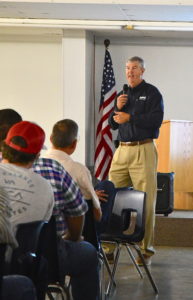
Dr. Joe Outlaw, co-director of the Agricultural and Food Policy Center at Texas A&M University and Texas A&M AgriLife Extension Service economist in College Station, provided a farm bill update at the recent Stiles Farm Field Day. Due to inclement tropical weather, the field day was moved indoors to nearby Taylor. (Texas A&M AgriLife Extension Service photo by Blair Fannin)
"Either way, you are going to get about the same strong support whether you get a new farm bill or they extend the current one," Outlaw said. "If they don't pass a bill, they will extend the current one."
With the Senate Agriculture Committee recently passing its new version of the farm bill and the House expecting a vote this week, time continues to march on towards the expiration of the current farm bill Sept. 30. Outlaw said he's "very upbeat" about current farm bill negotiations as mid-cycle elections draw closer in November. He told attendees he knew he wasn't delivering the brightest of news amid a backdrop of historically low commodity prices and tenuous trade relations with China.
"Unfortunately, we can't do anything current commodity prices or trade," he said. "If we lose our China trade market, will the government do something about it? Absolutely."
Dr. John Tomecek, AgriLife Extension wildlife specialist at the Stiles Farm, discussed tips on successful feral hog trapping. Blackland farmers as well as farmers across the state have sustained millions of dollars in damaged crops and rangeland.
"Last year, we saw $125 million worth of damage to small grains crops in Texas," he said. "To put our Texas feral hog population into context, we have 5.3 million wild hogs. Compare that to 4 million whitetail deer."
Tomecek said Texas' feral hog population is growing at such an explosive rate that Texans would have to kill two-thirds of the current population to just keep the current population numbers where they are.
"People ask 'Is the current situation under control?' I say no," he said.
Trapping can be effective if done properly. Tomecek provided examples of box traps and teardrop-shaped traps designed to catch large numbers of hogs, including the sounder or female hog. He said it's critical to capture the sounder hog since it can reproduce up to 50 pigs over a two-year span.
Dr. Gaylon Morgan, AgriLife Extension state cotton specialist from College Station, gave an update on new cotton innovations. He said ginners having problems with getting plastic in their ginned cotton. Additionally, he told farmers to make sure they line up their cotton bales and not place them on standing stalks since they are prone to rip holes in the plastic protective wrap.
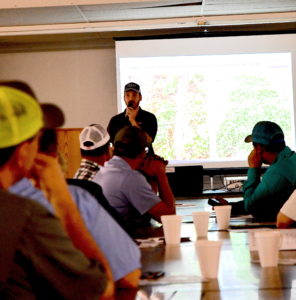
Stiles Farm Manager Ryan Collett moderates the program agenda, which included feral hog control, updates on new cotton technologies and integrated pest management strategies. (Texas A&M AgriLife Extension Service photo by Blair Fannin)
During the noon program, Macie Scarborough of Bishop received a Stiles Farm Foundation scholarship. Scarborough has been a Nueces County 4-H member for 10 years and will be attending Texas A&M studying agribusiness. Emily Murphy of Cleburne also received a Stiles Farm scholarship. She is a Bosque County 4-H member and will be attending Tarleton State University majoring in the agricultural industries program.
Bob Avant, director of corporate relations for Texas A&M AgriLife Research and president of the Williamson County Farm Bureau, presented Terry Poldrack the Producer of the Year Award and Larry Sladek the Agribusiness Award.
The annual field day is conducted by the AgriLife Extension in cooperation with AgriLife Research and the College of Agriculture and Life Sciences at Texas A&M.
-30-
- Writer: Blair Fannin, 979-845-2259, b-fannin@tamu.edu
- Contact: Ryan Collett, 512-898-2214, rmcollett@ag.tamu.edu
THRALL – Feral hog trapping, soybean performance in the Blacklands, pecan tree management and the latest farm bill information will all be discussed at the Stiles Farm Field Day scheduled June 19 in Thrall.
The field day is hosted by the Stiles Farm Foundation and the Texas A&M AgriLife Extension Service. There is no registration fee courtesy of the Williamson County Farm Bureau. Lunch and door prizes will be provided to field day participants courtesy of local agribusiness sponsors.
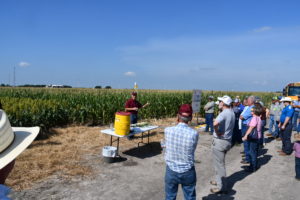
The Stiles Farm Field Day is set for June 19 at the Stiles Farm in Thrall. The program features a number of cropping updates affecting Blacklands producers. (Texas A&M AgriLife Extension Service photo by Blair Fannin)
Two continuing education units will be given for Texas Department of Agriculture pesticide applicator license holders: one general and one integrated pest management.
"This year's field day will feature topics of interest to a variety of producers and landowners in the Blacklands," said Ryan Collett, farm manager and AgriLife Extension specialist. "The program is geared towards helping Blackland producers stay current with new technology and learn more about operating efficiencies during times of low commodity prices.
"But, with pecan management, fence building and feral hog trapping presentations, we think there is something of interest for everyone."
Morning session topics and AgriLife Extension speakers include:
– Tips For Success with Feral Hog Trapping, Dr. John Tomecek, wildlife specialist, San Angelo.
– Innovations in Cotton, Dr. Gaylon Morgan, state cotton specialist, College Station.
– Cotton Pest Management Update, Dr. David Kerns, statewide integrated pest management coordinator, College Station.
– Can Soybeans Work in the Blacklands?, Dr. Ronnie Schnell, cropping system specialist, College Station.
– Cotton Fertility and Cover Crop Management, Dr. Jake Mower, soil specialist, College Station.
– Row Crop Weed Identification and Management, Dr. Scott Nolte, state weed specialist, College Station.
Afternoon sessions will include:
– Farm Bill Update at KC Hall, Dr. Joe Outlaw, AgriLife Extension economist, College Station.
– Pecan Production in the Blacklands, Dr. Monte Nesbitt, horticultural specialist, College Station.
– Stay Tuff Fence Building Demonstration.
The noon meal and program will feature the presentation of the Agriculturalist of the Year and Stiles Farm Foundation scholarships.
The Stiles Farm Foundation was established by the Stiles family at Thrall in Williamson County. According to the foundation, J.V. and H.A. Stiles wanted to commemorate their father, James E. Stiles, and the land he worked. They also wanted to help neighboring farmers and others throughout the Central Texas Blacklands region learn new farming practices.
In 1961, the Stiles Farm Foundation was established and became part of the Texas A&M University System. The farm is used by AgriLife Extension and Texas A&M AgriLife Research, which conduct field experiments and use the facility as a teaching platform.
-30-
Writer: Steve Byrns, 325-653-4576, s-byrns@tamu.edu
Contact: Josh Blanek, 325-659-6523, j-blanek@tamu.edu
SAN ANGELO – Attendees to the upcoming Bennett Trust Land Stewardship Conference May 3-4 in San Angelo are in for the rare treat of touring two area ranches, the conference coordinator said.
"We will be touring two historic Concho Valley ranches — the Duff Ranch and the Head of the River Ranch — the second day of the event and ending the conference that evening at the beautiful Christoval Winery," said Josh Blanek, Texas A&M AgriLife Extension Service agent in Tom Green County.
The conference, funded by the Ruth and Eskel Bennett Endowment and hosted by AgriLife Extension, will start at 8 a.m. May 3 in San Angelo's McNease Convention Center, 501 Rio Concho Drive. The May 4 tour portion will also depart from the convention center after an on-site breakfast served at 7:30 a.m.
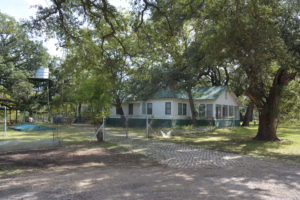
The historic Head of the River Ranch near Christoval will be part of the Bennett Trust Land Stewardship Conference May 3-4 in San Angelo. (Texas A&M AgriLife Extension Service photo by Steve Byrns)
Individual registration for the public event is $75. Registration will be accepted the day of the event. More information on the trust and complete conference information is available at https://agrilife.org/bennetttrust/ or by contacting Blanek at 325-659-6523.
The first tour stop will be on the Duff Ranch, which recently received the Texas Department of Agriculture Family Land Heritage Award for continuous operation by the same family for 100 years. Stops on the ranch will feature various aspects of responsible brush management, Blanek said.
"We'll see examples of the benefits of prescribed fire on southern Tom Green County rangeland and see pasture being prepared with fire breaks for future burning as well as recently burned sites and another site two years post-burn," Blanek said.
"Dr. Morgan Russell, AgriLife Extension range specialist at San Angelo, will also be on hand to demonstrate individual plant treatment equipment and explain the latest in chemical brush control using these methods. Trip Hallman of the ranch will discuss how landowners can work with energy companies to benefit their properties."
After lunch served at the Duff Ranch headquarters, the tour will travel to the Head of the River Ranch, a property Blanek described as being steeped in a rich history.
"This beautiful ranch is where the South Concho River originates from springs bubbling from the rock," he said. "Ryland Howard and son Anson will discuss the ranch's considerable history, which includes the beginnings of the American quarter horse. We'll also hear how the owners plan to pass the ranch down to future generations through well thought out successional plans."
Other presentations at the ranch will include discussions of establishing riparian buffers, and livestock and wildlife management in the ranch's riparian areas. Speakers will be Dr. Reid Redden, AgriLife Extension state sheep and goat specialist at San Angelo, and Dr. John Tomecek, AgriLife Extension wildlife specialist at Thrall.
"The tour's last stop is the Christoval Winery, located among the large live oak trees on the South Concho River," Blanek said. "There participants will end the conference in high style while being treated to a wine production and wine tasting session before traveling back to the convention center in San Angelo."
-30-
Source: https://wildlife.tamu.edu/tag/dr-john-tomecek/
Belum ada Komentar untuk "Llano Beef Cattle Field Day 2018"
Posting Komentar